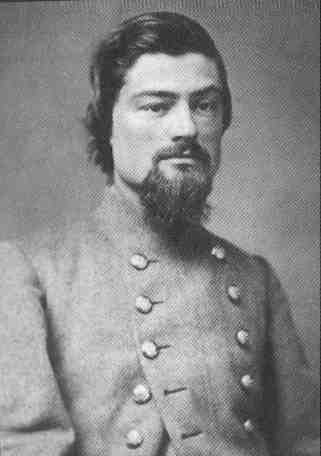Colonel Basil Wilson Duke |
With Hobson hot on his heels, however, Morgan was soon forced to abandon his conquest. On the evening of July 9 Hobson's troops began crossing the river and by 2:00 a.m. all were across. As they rode toward Corydon, in a column three miles long, they were greeted by cheering crowds, who sang "Rally Round the Flag Boys" and pressed so much food on them that soldiers complained of being overfed. Hobson later reported that, as he and his troops journeyed through Indiana and Ohio, "Hundreds, yes, thousands of people gave up their last morsels of provisions to aid us in overtaking the invaders, while thousands of beautiful young ladies and enthusiastic matrons and children handed us water and bread as we passed their doors. It was one grand cheering procession, urging us forward and enlivening our march." In his diary, Blair wrote, "We were received and treated through the entire route on free soil with greatest enthusiasm and kindest treatment but have to travel so fast and lose so much sleep that we are unable to properly appreciate respects." Another problem for the pursuers was a lack of horses. Morgan swept the country clean of fresh mounts, leaving behind his worn-out jades for Hobson's men. Nonetheless they were determined close the gap, which was nearly 25 miles on the afternoon of the 10th. Colonel Wolford, commanding the contingent that included the 45th, could be seen everywhere up and down the line, encouraging the troops by word and example. |
That day, reported Durling, the 45th was joined "by a lot of squirrel hunters of Indiana." The regiment rode until after dark and camped five miles from the town of Salem, Indiana. The next day, hearing that Morgan had traveled all night, they headed straight east, passing through Salem, Canton, New Philadelphia, Vienna and Lexington -- a ride of nearly 25 miles -- and camping near Lexington. Meanwhile, Morgan's raiders were taking a zigzag path through the southeastern corner of the state, burning bridges, destroying rail lines and appropriating supplies from citizens and merchants. They also forced locals to guide them through the unfamiliar countryside. They were, however, usually polite to the women who served them meals en route, paying them in either Confederate or US dollars, the latter being spoils of war. On the 12th, after feeding their horses and breakfasting at Parris, the 45th passed through Dupont and Rexville. At Dupont, they stopped briefly to eat food the local citizens had prepared. One woman, Margaret Rawling, spent the entire day cooking, first for the raiders, then for Hobson's troops. The 45th camped that night near Versailles. |
On the 13th Morgan crossed into Ohio at West Harrison, with Hobson close behind. Morgan's rear guard, commanded by Colonel Leroy Cluke, could see a dust cloud rising above the treetops behind them -- Hobson's cavalry. That evening the 45th crossed the White Water River at Harrison -- Morgan's men had burned the bridge -- and camped near the state line. They slept in Indiana, while their horses rested in Ohio. |
On the 14th Morgan headed for Ripley on the Ohio River, with Hobson only ten miles to his rear. Finding a heavy concentration of militia around the town, he decided against crossing, instead heading straight east, toward Buffington Island in Meigs County, where the river was said to be only two feet deep. Hobson stayed on his trail, passing through Sardinia, where the 45th camped on the 15th, and then onto Winchester and Locust Grove the next day. ("Morgan as far ahead as ever I guess," Durling wrote disconsolately in his diary for the 16th.) Meanwhile, arriving in Portsmouth, Judah and his forces started toward Buffington Island, thirty miles away. |

By the time he reached Ohio, Morgan was down to 2,000 men, with nearly 500 killed, wounded or captured in the first eleven days of the raid. Hobson's troops, by their hard pressing of the Confederates, were responsible for a large number of this total. Others had also played a role in the drive to stop Morgan, including local militias, ordinary citizens and another column of Federal troops under the command of General Henry Judah, but it was Hobson and his men who chased Morgan the longest and closest. |
After riding through Hamilton Country, north of Cincinnati, on the 14th, the 45th camped at Mt. Repose. (Durling wrote that he had changed mounts that day after finding "a rebel horse which proves to be good.") The next day the regiment passed through Williamsburg, where Morgan's men had burned a bridge. They went around the bridge and continued their chase, staying in town only long enough to eat food prepared by the local ladies and set out on the main street on tables made of long boards, boxes and barrels. Meanwhile, Judah's troops, which had spent thirty-six hours waiting to cross the flooded Green River in Kentucky, gave up the pursuit and headed for Louisville, where they boarded steamboats. By the 14th they were in Cincinnati with the object of heading upstream and stopping Morgan before he could cross the Ohio River into friendlier territory on the West Virginia side. Another 325 cavalry troops under Major George Rue boarded trains for Bellaire, Ohio, across the river from Wheeling West Virginia, again with the aim of getting a jump on Morgan. |